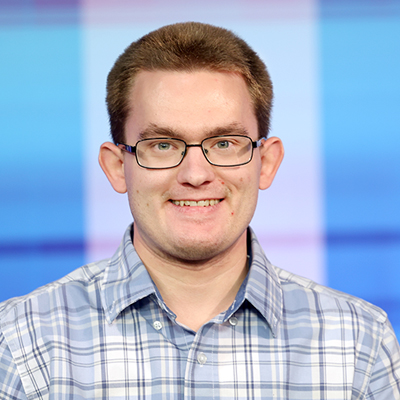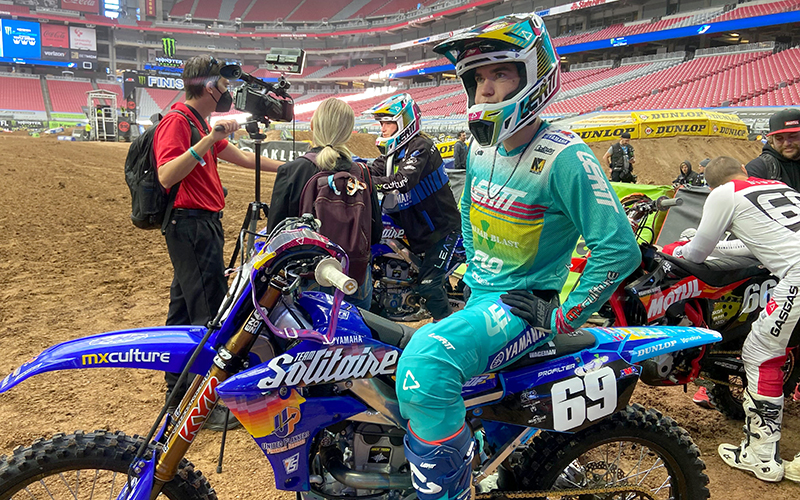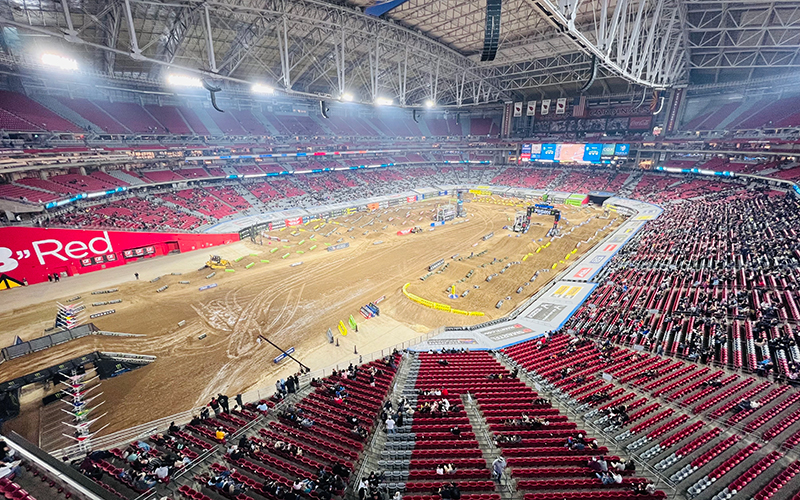GLENDALE – Some teams are literally better equipped to succeed in the Monster Energy AMA Supercross Championship than others in the series.
Factory teams backed by the sport’s seven dirt bike manufacturers – companies such as Kawasaki, Suzuki and Yamaha – enjoy bigger budgets and better riders than teams without factory support.
But that doesn’t mean that independent racing teams like Glendale-based Team Solitaire can’t be competitive and have an impact on the sport.
That’s what brought Team Solitaire co-owners Chris Elliott and Ryan Clark together. The two met while Elliott, a digital marketing expert, was working for a Supercross 250SX team and the pair connected over a common cause.
“We saw an avenue to help riders while staying (financially) viable in a sport where factories are spending millions,” Elliott said.
Supercross is dirt-bike racing on courses built with various jumps and sharp turns. Unlike motocross, the sport that Supercross is derived from, Supercross races are typically held in football and baseball stadiums across the country. The sport includes two classifications, the 450SX class, which features heavier, faster bikes, and the 250SX class, with riders utilizing less powerful, but more nimble bikes.
One of the biggest advantages the factory teams have in the sport are their bikes – and the latest parts for them. Kawasaki’s 2022 450SR bike, for example, includes a new cylinder head, a new exhaust system and new shocks and clamps, among other improvements.
The opportunity to ride factory bikes supported by big budgets attracts the best riders, which all adds up to dominance by factory teams. They have won every race in both the 450SX class and the 250SX class so far in 2022, with races remaining in Foxborough, Massachusetts and Denver along with the 2022 Supercross World Championship in Salt Lake City on May 7.
Team Solitaire does not benefit from any of the advantages a factory team enjoys. Despite improvement in races leading to improvement in the season-long standings, the team is not a serious contender for a season-long championship.
Yet, no one at Team Solitaire is focused on winning season championships. Instead, Team Solitaire is doing things differently behind the scenes to remain financially viable while providing a proving ground for up-and-coming riders in the 250SX West classification.
Not much about Team Solitaire is typical in Supercross, including the way the team evolved.
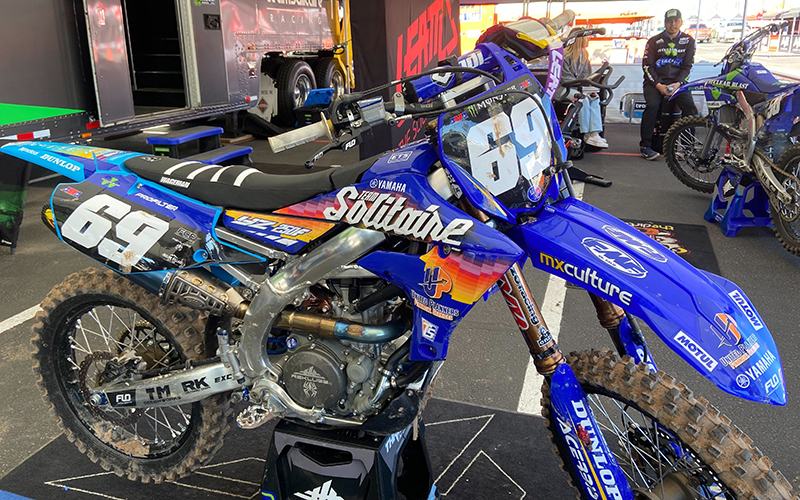
Team Solitaire’s Phoenix Suns-inspired bike, here sitting in the team’s pits just outside Glendale’s State Farm Stadium, is an example of the group’s creativity. (Photo by Nicholas Hodell/Cronkite News)
Early partnership
Elliott’s passion for bikes was evident at a young age. The passion began to blossom when his dad got him a bike. According to Elliott, he and his dad would spend their spare time working on the bike and race during the weekends.
He remembers the sights and sounds of going to Supercross races once a year when the series went to Minneapolis, which the series first visited in 1994.
“Supercross specifically was always so appealing from a visual standpoint, all the new gear, shiny bikes. And the show itself was so mesmerizing,” Elliott said via email.
His marketing experience and his passion for bikes came full circle when signed a marketing contract with a Supercross 250SX team. While working on that deal, he met Clark.
The partnership blossomed, and in 2016 Elliott and Clark decided to reincarnate Team Solitaire, which Elliott had originally started in the early 2000s. The new version of the team began its first Supercross season in 2017.
Clark, who has lived in Arizona for the past two decades, calls Team Solitaire his “passion project.”
And the passion isn’t just about the love for bikes and Supercross. It’s also about leveraging Elliott’s digital marketing background to introduce people to the sport in a cost-effective manner.
“We’re trying to do these VIP things and these single-race partnerships that we feel might be a little bit more affordable for people, and then just get them out, get a taste of it,” Clark said.
During race day, that marketing strategy comes to life with special paint schemes, such as the team’s Phoenix Suns-inspired scheme used in Glendale this year. The strategy has been in place for several years, as shown by the team’s Arizona Cardinals-inspired outfit used in the 2020 Supercross event in Arizona. Team Solitaire featured a special Cardinals-themed bike in the pits before that year’s race with a rider’s helmet modeled after the Cardinals headgear and a racing suit fashioned in honor of former Cardinals star Larry Fitzgerald.
The team also uses themes inspired by its current primary partner Nuclear Blast, a heavy metal record label.
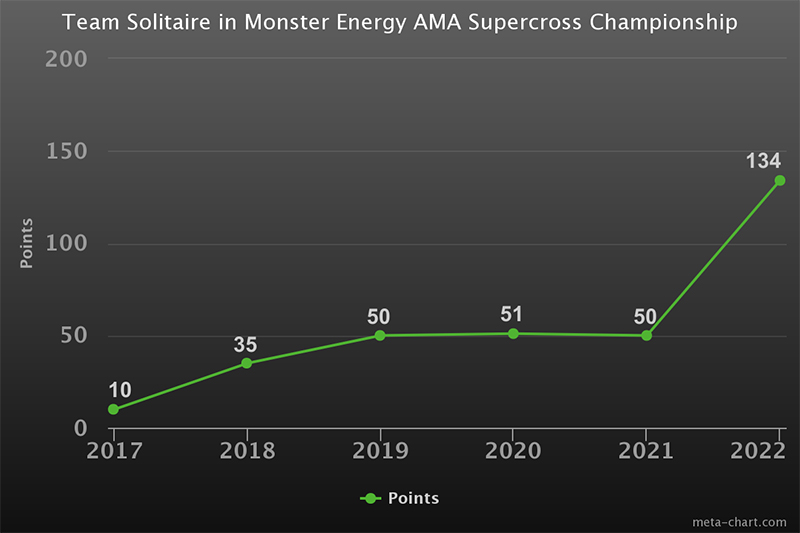
(Data visualization courtesy of Meta-chart.com)
Making it work
Team Solitaire is not just unique by their marketing strategies and paint schemes at various Supercross races. It’s also unique in that everyone has their own other responsibilities outside of the team.
Clark works at Stacy and Witbeck, a construction contractor. Elliott works as a real estate agent.
Team Solitaire’s two mechanics, Eric Angelski and Colin Burgh, work at Crank Works in Tempe as machinists. Crank Works is a repair shop that specializes in crankshaft services for a variety of vehicles, including motorcycle work that is helpful for work in Supercross. The company also works on ATVs, watercraft, snowmobiles and off-road utility vehicles.
This makes getting everyone together to work on team-related projects challenging because they live in different areas of the Valley.
“The last thing they want to do is drive further west out to my house to do it, so we just work at whatever makes sense,” Clark said.
Just like their job building the team’s motorcycles, Team Solitaire’s mechanics built the solution to the team’s location problem.
All of the team’s mechanical work is done in Angelski and Burgh’s garage in Maricopa, where they share a house. According to Angelski, they renovated their garage to make a space where they have everything they need to work on the team’s Yamaha bikes.
“It feels more like a shop and more of a workspace,” Angelski said. “Because we have such long hours, it seems like that works out doing it that way the best rather than having a location and having to go there and then drive home and go to work and do all of that.”
After they are done with their 8-to-5 job at Crank Works, they go home and work on Team Solitaire’s motorcycles well into the night. Angelski estimates that he works more than 100 hours a week between his two jobs, comparing his workload to “two full-time jobs and a part-time job.”
During an average season, Angelski and Burgh build eight to 10 bikes. According to Angelski, each bike takes two to three days to complete.
Even on race weekends, the team’s prep work is nowhere near finished with the team utilizing different marketing schemes on a race-to-race basis, Angelski said.
“We usually show up on Friday at the races and we have to install graphics, plastics and seat covers onto the bike,” Angelski said. “Most teams already have that done throughout the middle of the week or so because their scheme doesn’t really change.”
Working more than 12 hours a day at different jobs can take a toll. However, Angelski said his work for Team Solitaire is not about him or his personal goals.
“You’re willing to do anything to help your rider achieve their goal and get to the next level,” he said.
Luckily for everyone involved at Team Solitaire, they get support from their regular employers.
When Supercross came to Glendale in January, Clark especially felt the love from Stacy and Witbeck. According to Clark, the vice president of the company and his project manager came to the Glendale event to support Clark’s team.
At Crank Works, Angelski said he is allowed to take Fridays off during the season. Having that day off, though, is not the only benefit he gets from the company. He also cherishes what he learns from his bosses.
“Being able to help us out with the knowledge that the owner, Phil Schaefer, has about this industry and be able to help us in plenty of other aspects is phenomenal,” Angelski said.
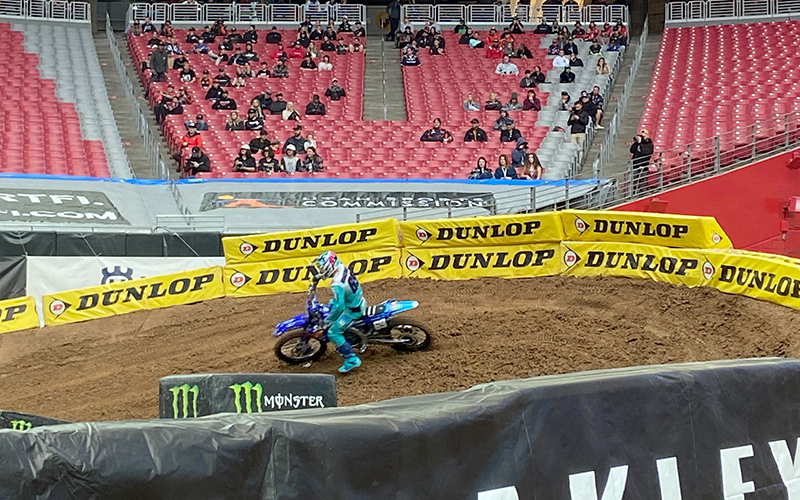
Wageman showcases his skills at Glendale’s State Farm Stadium before competition in the Monster Energy AMA Supercross Championship season. (Photo by Nicholas Hodell/Cronkite News)
Team growth
Working a full-time job and then taking a second job may be done out of necessity for some. Those people may not feel the impact of their work outside of income coming in.
At Team Solitaire, though, every member of the team feels rewarded in some aspect.
“The rewarding part honestly ends up being the creative outlet I have with the team,” Elliott said.
For Clark, seeing his team grow inspires him to keep going. This growth is seen with one rider in particular.
Robbie Wageman has been with the team since 2020. He finished just inside the top 20 in the 250SX West season standings during his first two seasons, then made a big jump this year into the top 10.
“He’s grown tremendously and so, for us, that’s really fulfilling and that’s what fuels us,” Clark said. “This year, we brought on Ryan Surratt, who is just in the infancy of our relationship with him and we hope to create that same type of growth curve with him.”
Angelski concurs with Clark. From the mechanic’s point of view, he sees his hours and hours of work come to fruition when a rider succeeds on the bikes he builds. It makes the grind of a season that lasts from January through May worth it, despite the other responsibilities.
“We all work so incredibly hard, and we know we’re working harder than a lot of other people in this industry,” Angelski said. “With a full-time job and everything, it’s super rewarding, especially when we have a good result.”
